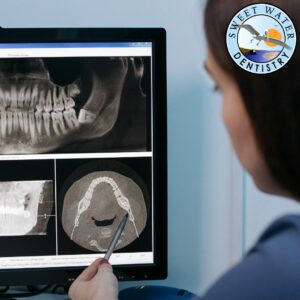Will I Need a Bone Graft Before Getting Dental Implants?
Dental implants are a life-changing solution for individuals who have lost one or more teeth. They provide a natural look, restore function, and prevent the bone loss that often accompanies missing teeth. However, before you undergo an implant procedure, your dentist will evaluate whether your jawbone is strong enough to support the implant. In some cases, a bone graft may be necessary to ensure the success and longevity of your dental implants.
 What Is a Bone Graft?
What Is a Bone Graft?
A bone graft is a surgical procedure used to rebuild or strengthen the jawbone. It involves adding bone material to areas where the bone is insufficient, allowing for proper support of dental implants. The bone material used for grafting can come from different sources, including:
- Autograft – Bone taken from your own body (e.g., hip, chin, or another part of your jaw).
- Allograft – Bone sourced from a human donor, usually from a tissue bank.
- Xenograft – Bone derived from an animal source, typically bovine (cow) bone.
- Synthetic materials – Biocompatible materials that encourage natural bone growth.
Over time, the graft material fuses with your existing bone, creating a solid foundation for implant placement.
Why Might You Need a Bone Graft Before Implants?
Not all patients require a bone graft before getting dental implants, but several factors may necessitate this procedure:
1. Bone Loss Due to Tooth Loss
When a tooth is lost and not replaced promptly, the jawbone in that area begins to deteriorate. Without stimulation from a tooth root, the bone may shrink over time, reducing the chances of a successful implant.
2. Periodontal Disease
Gum disease can cause the bone supporting your teeth to break down. If you have suffered from advanced periodontal disease, your jawbone may not be strong enough to hold an implant securely.
3. Trauma or Injury
Accidents, facial injuries, or conditions that affect bone density may lead to significant bone loss. In these cases, a bone graft may be needed to restore the jaw’s structural integrity before implants are placed.
4. Natural Bone Deficiencies
Some people naturally have a thinner or weaker jawbone. If your bone structure is insufficient to support an implant, a bone graft may be required to provide stability.
5. Long-Term Denture or Bridge Use
Wearing dentures or bridges for many years without implants can result in bone resorption. Since these restorations do not stimulate the jawbone as natural teeth do, bone volume may decrease over time, making a graft necessary.
Types of Bone Grafting Procedures for Dental Implants
The type of bone grafting procedure recommended will depend on the severity of bone loss and the location where the implant will be placed.
1. Socket Preservation (Ridge Preservation)
If you have a tooth extracted, your dentist may perform a bone graft at the time of extraction to prevent bone loss. This procedure, known as socket preservation, fills the empty socket with graft material to maintain bone volume for future implant placement.
2. Ridge Augmentation
If the jawbone has already deteriorated due to long-term tooth loss, ridge augmentation may be necessary. This procedure rebuilds the bone structure, creating a more suitable environment for implants.
3. Sinus Lift (Sinus Augmentation)
For those missing upper back teeth, a sinus lift may be required if the sinus cavity has expanded into the area where bone is needed. This procedure adds bone beneath the sinus membrane to create enough space for implant placement.
How Long Does It Take to Heal From a Bone Graft?
The healing period for a bone graft varies depending on the extent of the procedure and the individual’s healing ability. In general:
- Minor grafts (such as socket preservation) may heal within 3 to 6 months.
- More extensive grafts (such as ridge augmentation or sinus lifts) may require 6 to 9 months before the implant can be placed.
During this time, the graft integrates with your natural bone, creating a stable foundation for the implant. Your dentist will monitor your progress to determine when it is safe to proceed with implant placement.
What to Expect During the Bone Graft Procedure
A bone graft procedure is typically performed under local anesthesia, though sedation options may be available for your comfort. The steps involved include:
- Preparing the site – The area is numbed, and any damaged tissue or infection is removed.
- Placing the graft material – The bone graft material is added to the deficient area.
- Securing the graft – A special membrane or stitches may be used to keep the graft in place.
- Healing process – Over time, the graft material will integrate with your natural bone.
After the procedure, mild swelling, discomfort, and minor bleeding are normal. Your dentist will provide post-operative care instructions, including dietary recommendations and pain management tips.
Is a Bone Graft Worth It for Dental Implants?
While a bone graft may extend your treatment timeline, it is often essential for long-term implant success. A strong jawbone ensures:
- Stability and durability – Implants last longer when anchored in a solid bone structure.
- Better aesthetics – A healthy bone structure helps maintain facial shape and prevent sagging.
- Improved function – Strong bone support allows you to chew and speak comfortably.
Without a bone graft, placing an implant in a weakened jawbone increases the risk of implant failure. Investing in a bone graft enhances the chances of a successful outcome and a confident, lasting smile.
Conclusion
If you are considering dental implants but have concerns about bone loss, a bone graft may be necessary to ensure a successful procedure. At Sweet Water Dentistry, we provide comprehensive evaluations to determine the best course of action for your dental health. Our experienced team will guide you through every step, from diagnosis to treatment, so you can achieve a beautiful and functional smile.
To schedule a consultation and learn more about your dental implant options, contact Sweet Water Dentistry today!
Visit us for expert care:
Sweet Water Dentistry
📍 5915 Sweetwater Cir, Fairhope, AL 36532
🌐 sweetwatersmile.com
📞 Call or Text: (251) 210-2773
Follow us on Facebook and Instagram for the latest updates and special offers!


